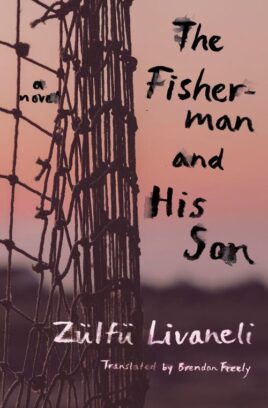You have no items in your cart. Want to get some nice things?
Go shopping
The title of this novel is well-chosen – it has the ring of a fable, the echo of a tale from A Thousand and One Nights and indeed, in many ways, The Fisherman and His Son would fit comfortably in a collection of such work. It has magical element in which the sea and its inhabitants play a crucial role. It bears a strong moral message that is uncomplicated by sophisticated literary devices. Yet it is this very simplicity that is the book’s strength, for it allows the importance of the issues it raises to come to the fore.
A musician, politician and activist, Livaneli has long been vocal about global affairs, and it is perhaps not surprising that he should have chosen the current refugee crisis – a crisis in which his native Turkey is on the front line – for his latest work. The novel tells the story of a fisherman, Mustafa, and his wife Mesude, whose only son Deniz has drowned at sea. They are consumed by sadness and when the bodies of refugees start catching in Mustafa’s nets – and when a baby is found alive amongst them – they find it hard to give the child up, hatching instead an ill-conceived plan to claim it as their own.
Living in a small, coastal community, the couple represent the peripheral, those who live away from the centres of political and economic power. They live off the sea, selling fish to restaurants in which “they would never set foot,” the prices being “just too high.” The town itself is full of foreigners, German and English girls “whose white arms turned red as lobsters in the afternoon sun.”
This sense that the outside world is encroaching is a leit motif throughout the novel, for Livaneli is not just concerned with immigration, but also with climate change, mining and industrial-scale fish farming. He is keen to show the impact that broader, global concerns have on local people, how the uneducated and the poor are often sidelined by projects that purport to be about development and growth. When eventually Mesude decides to leave Mustafa, and to return the baby to its natural mother, Mustafa takes his fury out on the puffer fish, the poisonous “monsters” that were “swarming in from unknown seas like a plague sent by God,” putting the fishermen’s livelihoods at risk. The fish are foreign and invasive and for Mustafa become a symbol of the external forces that are changing his world: “these foreign people and foreign fish resembled each other. They were all rapacious and destructive.”
The feeling of invasion is felt on all sides, affecting not only the community’s main source of sustenance, but its physical appearance, its smell and wholesomeness. The forest has been cut down to make way for mines, using “a poison called cyanide” which will “seep into the groundwater and give us all cancer.” Once beautiful bays have filled up with fish farms, that are “prisons, in which millions of fish darkened the waters, leaving a foul smell hanging over the bays.”
What Livaneli offers is a place in which, like the migrants who risk their lives crossing the sea, the fishermen find themselves caught up in forces that are way beyond their control. Their existence is threatened by the machinations of higher powers that are driven by profit from which it seems the locals are doomed never to benefit. In a preface to the novel, Livaneli tells of his lifelong passion for the sea, a passion born of a boyhood fascination with Hemingway. He tells of a brief stint he spent in Eskihisar, where he dreamed of a life spent “fishing and writing books.” The novel is seeped in this passion, paying homage to the men and women who get up early and work hard to put food on other people’s tables. Indeed, this time spent learning how to cast nets and care for the boats – combined with the author’s experience on the world stage as a goodwill ambassador for UNESCO – work to produce a novel that is a plea for the core values of humanity: for solidarity and compassion over business and globalization. It is a novel that on the surface feels quite innocent, but which has a deeply troubling core, for in making the global local, Zülfü Livaneli demonstrates the very real impact that issues like climate change, immigration and industrialization have on small, often voiceless communities. He depicts with gentle humility the conflict between international and local interests, suggesting that in overlooking the latter, we are in danger of losing the very humanity – the greater good – that a global outlook is supposed to serve. Livaneli’s work is gentle and discreet, his world innocent and earnest. It is a place into which we should all take the time to pause and reflect.
By Zülfü Livaneli
Translated from the Turkish by Brendan Freely
Other Press, 208 pages
Elspeth Revira
Elspeth Revira is a thinker and writer based in rural South-West France. With a background in research and art-based journalism, she is currently working on her first novel.




